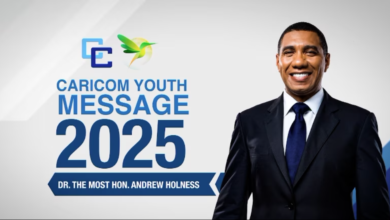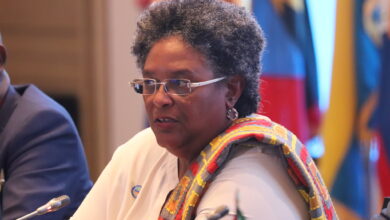(CARICOM Secretariat, Georgetown, Guyana) As the Caribbean region seeks to intensify its response in the fight against HIV/AIDS, a number of the Region’s youth are being empowered to develop and implement community-based HIV/AIDS prevention, care and support and stigma and discrimination projects.
The capacity building initiatives and financial resources are being provided under the Pan-Caribbean Partnership Against HIV/AIDS (PANCAP)/CARICOM Youth Ambassadors (CYAs) Mini-Grant Programme which was launched this year. HIV/AIDS prevention initiatives target youth between the ages of 15-29 living in difficult circumstances.
At the start up of the pilot year of the project in March, a sum of US$10,000 each was extended to eight PANCAP Member States. These include The Bahamas, Belize, the Dominican Republic, Grenada, St. Vincent and the Grenadines, St Lucia, St. Kitts/Nevis and Trinidad and Tobago.
The PANCAP/CYA mini-grant program has since equipped 165 youths from five of these countries with skills training in resource mapping, 60 from two States in project development, and another 60 in HIV/AIDS sensitisation. Four community based organisations in St. Lucia have developed approved projects and four more in St. Vincent and the Grenadines have drafted project proposals.
Reporting on the progress of the programme at day two of the Thirteenth Meeting of the Council for Human and Social Development COHSOD in Georgetown, CARICOM Secretariat’s Deputy Programme Manager for Youth, Dr Heather Johnson said the programme was not without its challenges. She listed deteriorating community resources, poor health services and inadequate financial resources among the deterrents, and called for greater collaboration with social service Ministries and other stakeholders across the Region to improve the situation.
Dr. Johnson pointed out that UNICEF, UNFPA, GTZ and the International Federation of the Red Cross were among regional agencies partnering with PANCAP and the Youth Ambassadors in conducting the regional programme.
She said National Youth Councils, the Commonwealth Youth Caucus and other agencies were involved at the national level, and noted that four additional countries are expected to benefit next year.
The youth leadership development programme empowers trainees to plan, monitor, and evaluate the mini-grant projects with adult support. It is being executed by PANCAP, the CYA regional Implementing Agency and facilitated by the CARICOM Secretariat regional facilitating agency.
In the meantime, the CARICOM Youth Ambassadors Programme has been hailed as Best Practice model for youth engagement throughout the Region. The CARICOM Youth Ambassadors Programme is an institution of CARICOM that was appointed by Heads of Government in 1993 and reactivated in 2000.
It comprises youth representatives from CARICOM Member States and Associate Member States, who are involved in sensitising their peers about the Community, while bringing the perspectives of youths to Heads of Government of the Region.





